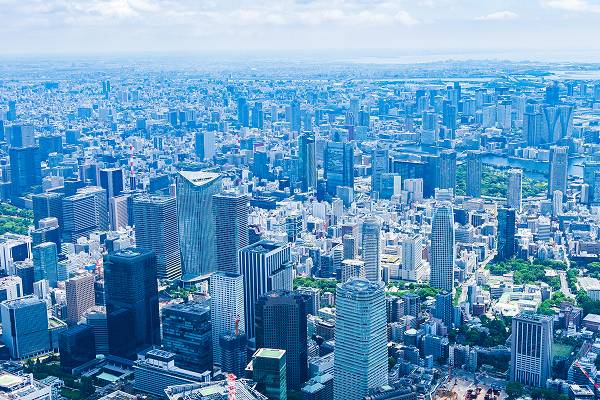Environment Environment

Sustainability Promotion System
The Company's Risk Management Committee, chaired by the President and composed of members of the Board of Directors and others, deliberates and makes decisions on important issues that are considered risks.
In addition, we will work with the Business Progress Confirmation Meeting, which promotes our medium-term management plan to place ESG and SDGs initiatives and climate change initiatives at the core of our management, to ensure that our carbon dioxide (CO2Under management's leadership and control, we are promoting sustainability initiatives across our businesses, including emission reductions.
By identifying important social issues to be addressed by the Company and linking them to the values of the Group and each strategy in the medium-term management plan, we will steadily implement measures that will contribute to the goals of the SDGs and lead to the development of the Group.
CO2 Emissions Monitoring
Scope 1 and Scope 2 CO2 emissions are calculated and monitored every fiscal year.
In addition, we have independently calculated the amount of reduction contribution to be realized by expanding sales of decarbonization-related products in a manner similar to Scope 3 Category 11, and are actively working toward achieving carbon neutrality with the goals of a 20% reduction by 2030, a 58% reduction by 2040, and a 100% or greater reduction by 2050. We are actively working to achieve carbon neutrality.
| fiscal year (usu. April 1 to March 31) | Fiscal Year 2021 | Fiscal Year 2022 | Fiscal Year 2023 | Fiscal Year 2024 | |
|---|---|---|---|---|---|
| Scope 1 | 496 | 596 | 547 | 660 | |
| Scope 2 | market standard | 1,248 | 1,037 | 1,147 | 1,446 |
| Location Criteria | 1,480 | 1,472 | 1,367 | 1,524 | |
- FY2021-FY2024 Results
- Scope 1: CO₂ emissions directly emitted by the company. City gas was calculated based on the then current version of the "List of Emission Factors by Gas Utility. Diesel oil and gasoline were calculated based on the then-current version of the "Emission Unit Database for Calculation of Greenhouse Gas Emissions of Organizations through Supply Chains" by the Ministry of the Environment and the Ministry of Economy, Trade and Industry. Kerosene was calculated based on the Ministry of the Environment's "List of Calculation Methods and Emission Factors for Calculation, Reporting, and Publication Systems. Propane and butane were calculated based on the "Guidelines for CO₂ emissions intensity of propane, butane, and LP gas" by the Japan LP Gas Association.
- *Scope 2: Indirect CO₂ emissions from the use of energy purchased from other companies (in our case, electricity). Calculated based on the then-current version of the "List of Emission Factors by Electric Utility" by the Ministry of the Environment and the Ministry of Economy, Trade and Industry.
Strategies for Sustainability
In accordance with the Japanese government's "Green Growth Strategy Accompanying Carbon Neutrality in 2050," we will promote our green growth strategy, viewing the response to global warming as an opportunity for growth.
The industrial furnace industry as a whole is expected to be affected by declining demand for industrial furnaces that use fossil fuels as their heat source and a decrease in the number of parts used in EVs, but on the other hand, demand for EV-related parts such as motors and batteries for automobiles, hydrogen and ammonia combustion, and electrification is increasing, and regenerative burners, oxygen-enriched combustion equipment, etc. are expected to continue, Capital investment in energy-saving combustion equipment such as regenerative burners and oxygen-enriched combustion equipment, as well as in equipment upgrades, is expected to continue for the time being.
In addition, in the mid- to long-term, we will promote the development of ammonia burners for coal-fired power generation with the aim of going carbon-neutral.
We believe that we can contribute to improving factory efficiency and reducing environmental impact by providing technologies and services that meet customer needs, centered on thermal technology, which is our core competence.
In addition, by providing carbon neutral technologies and services, including hydrogen and ammonia combustion and electrification, which we have developed, we aim to make a significant contribution to reducing our customers' CO2 emissions.
Sustainability Indicators, Targets, and Performance
Since a large portion of our supply chain emissions are from the "use of our products," we have set a decarbonization target for 2050 based on our standards.
Emissions from our products in 2013, the baseline for Japan's reduction target under the Paris Agreement, was approximately 12 million tons, or roughly 1% of Japan's total CO2 emissions.
We have set a goal of reducing these emissions to virtually zero by 2050. Although it is impossible to achieve zero emissions, we aim to achieve carbon neutrality by 2050, including reductions in CO2 emissions from products other than our existing products.
Specifically, we have independently calculated the amount of reduction contribution to be realized by expanding sales of decarbonization-related products in a form similar to Scope 3 Category 11, and are actively working toward achieving carbon neutrality with the goals of a 20% reduction by 2030, a 58% reduction by 2040, and a 100% or more reduction by 2050. We are actively working to achieve carbon neutrality.
Scope 1 and Scope 2 CO2 emissions are also calculated and monitored each period.
| CO₂ emissions (10,000 tons/year) |
Emission Reductions (10,000 tons/year) |
Reduction rate (%) |
|
|---|---|---|---|
| FY 2013 CO₂ emissions | 1,200 | - | - |
| Reduction target: FY2030 | 960 | △240 | △20.0 |
| Actual reduction: FY2024 | 982 | △218 | △18.2 |
※CO2 emission reductions also take into account increases and decreases in emissions based on facility capacity and operating rates.
(Calculated based on the manufacturing industry production capacity index and capacity utilization index published by the Ministry of Economy, Trade and Industry)
Selected as a "Zero Emissions Challenge Company" by the Ministry of Economy, Trade and Industry
The Ministry of Economy, Trade and Industry (METI) of Japan has recognized our efforts in the following projects and selected us as one of the "Zero Emi Challenge Companies" that are boldly taking on the challenge of innovating toward the realization of a decarbonized society. The list of approximately 600 companies, including our company, was compiled as the second round of the "Zero Emi Challenge Companies," and the companies that were made public were selected based on their participation in the projects of the Ministry of Economy, Trade and Industry and the Ministry of Agriculture, Forestry and Fisheries (MAFF), which are linked to the "Innovative Environmental Innovation Strategy," and in 45 projects conducted by the New Energy and Industrial Technology Development Organization (NEDO). The company's contribution to zero emissions through the "Innovative Environmental Innovation Strategy" was highly evaluated and announced at the "TCFD Summit 2021" held on October 6, 2021.
Related News
- Chugai Ro's Technical Records Development of Hydrogen and Ammonia Combustion Technology for Carbon Neutralization in Industrial Furnaces
- NEWS MOU Signed with Taiwan's CSC on Decarbonized Combustion Technology (PDF : 226 KB)
- NEWS “Receipt of Order for Electric Furnace Dust Recycling Equipment from Tokyo Steel Corporation (PDF : 101 KB)
- NEWS Receipt of order for “Hot Dip Galvanizing Line Modification” from Tokyo Steel Corporation (PDF : 97 KB)
- NEWS Receives Order from Kobe Steel, Ltd. for Remodeling of Hot-Dip Galvanized Steel Sheet Facility (PDF : 105 KB)
- NEWS (Newspaper article) Chugai Furnace Manufacturing Co., Ltd. to develop a large-scale test furnace for decarbonization, utilizing ammonia fuel to double the development cost of a new type of burner (Nihon Keizai Shimbun, April 8, 2025).
- NEWS Delivery of Actual Ammonia Burner Equipment for World's First Commercial-Scale Demonstration Test (PDF : 127 KB)
- Combustion facilities (Article) Ammonia Supply Chain in Sight: Medium-Sized Firms, Dedicated Products for Practical Use (NIKKEI GX, March 5, 2025)
- NEWS Receipt of the Toyota Award for Excellence in Technical Development
- Other (Newspaper Article) "Contracts for Electric Furnace Ancillary Facilities Continue One After Another, Battery-Related Facilities Also Steady" (The Iron and Steel Daily, Nov. 14, 2024) (PDF : 437 KB)
- Combustion facilities (Published article) Chugai Furnace Halves Fuel Consumption of Hydrogen Burner, Utilizes Heat from Exhaust Gases (NIKKEI GX, November 5, 2024)
- NEWS Chugai's Products Selected as Advanced Equipment and Systems for "Energy Conservation Investment Promotion and Demand Structure Transformation Support Project" (PDF : 106 KB)
- Other (Newspaper Article) Selected for NEDO's Green Innovation Project "Decarbonization of Thermal Processes" (The Iron and Steel Daily, November 7, 2023) (PDF: 5 MB)
- NEWS Joint Development of Industry's First Decarbonized Decomposition Treatment Technology for Organic Fluorine Compounds (PFAS) (PDF: 844 KB)
- Other (Newspaper Article) Zero Emission, Carbon Neutral / Focus on Research and Equipment Development / Electric Furnace Dust Recycling Facility, Final Stage of Development (The Iron and Steel Daily, June 26, 2023) (PDF: 772 KB)
CHUGAI RO CO., LTD. is a group of engineers with a wide variety of know-how and experience.
We are promoting a shift to decarbonization-ready industrial furnaces and burners on a global scale to achieve carbon neutrality.
Please consult with us for IT implementation and energy conservation promotion for on-site issue resolution as well as social issue resolution.





